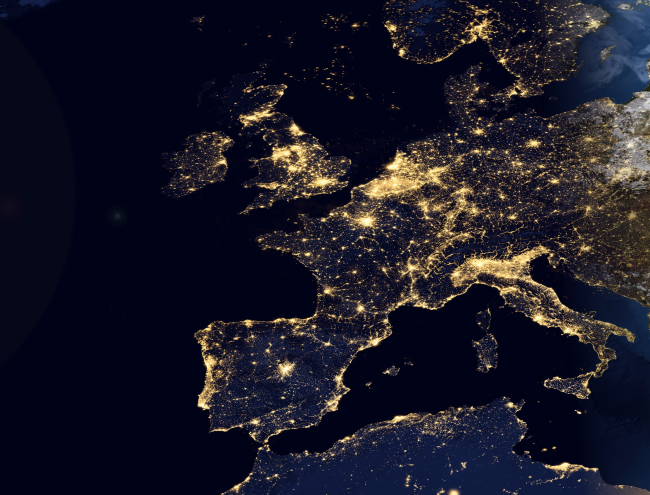European Energy Policy: Energy Savings Glass 2/3 Empty

Summing up Europe’s climate policies suggests we still haven’t grasped the full potential for energy savings. We act as if we were living in a system with infinite resources easily exploited by human innovation and ingenuity. We focus on the efficiencies we can gain from components of our system, but not on the system as a whole and we do not consider how the other billions of people on earth can achieve our level of comfort with a resource or carbon-constrained future and with aspirations that necessarily imply sharply growing energy consumption.
In fact, EU energy policies are too confined to energy efficiency and renewable energies. Efficiency policies are broken up by sector and product. Questions about re-defining our needs and load reduction are not considered as part of the solution. Efficiency is seen as a physical output/input ratio and technological improvements allow this ratio to be increased. Unsurprisingly, we never reach the theoretical savings potential particularly when market failures and weak policy implementation occur.
The European Council confirmed this mind-set by reminding us that “safe, secure, sustainable energy … remains a priority for Europe” and the way forward to achieve our objectives and to reduce our energy import dependency is for “the EU and its Member States to promote investment in renewables and safe and sustainable low carbon technologies”. In spite of the recognition by the European Commission that “we are unlikely to achieve a 20% reduction under the current set of policies” the European Council ended its statement by directing the blame at Member States because “the quality of National Energy Efficiency Action Plans, developed by Member States since 2008, is disappointing, leaving vast potential un-tapped”. According to the 27 Heads of States and Governments, “the move towards renewable energy use and greater energy efficiency in transport is happening too slowly. While we are broadly on track for the 20% target for renewables, we are a long way from achieving the objective set for energy efficiency” .
Although the original legislation allowed for a change in behavior or a sense of energy “frugality” to play a major role, over time the notion of frugality has been eclipsed by a single-minded drive for product efficiency. Our energy policy is based on the comparison of the efficiencies (output/input ratio) for products delivering the same service. We use efficiency labels to compare one product with another, but fail to grasp the bigger picture of a systemic awareness of overall energy consumption and growing demand for energy services.
By doing so, we ignore the increase in energy demand due to new functionalities and devices, or increases in size. In fact, even if the output/input ratio is better, big houses, larger cars and appliances still have high energy demand compared to small ones. Yet larger products are usually labeled as more efficient than smaller ones which misleads consumers on the total energy consumed. An example is the increase of big individual houses located in suburban areas which leads to more cars on our roads and more congestion. Maybe our cars, appliances and equipment are indeed more efficient but the system as a whole is not and the increase of primary energy demand is a reality.
The European Council highlighted the need for “a revolution in energy systems” to reduce our GHG emissions. However, this revolution will not be enough to meet the climate change challenge if it’s a “technology revolution” only. Efficient technologies will allow the reduction of our primary energy consumption only if addressing behavior is among the first steps in our energy policy, only if creating an awareness of the need to conserve energy - the sense of energy “frugality”. Promoting this sense of frugality is probably more challenging than improving technical efficiencies of products. It implies adjusting our lifestyles and questioning ourselves about our choices on individual houses, cars, new devices and the hundreds of daily decisions we make that bear on our personal energy consumption.
It’s time for a conceptual revolution in European energy policy: renewable energies and energy efficiency will not be sufficient to meet 21st century challenges. China and the US have placed conservation as a top priority in their energy policy. If the EU would like to assert its leadership on “green” technologies and innovation, we need an ambitious conservation policy - a sense of frugality - for all natural resources, realizing that energy efficiency is most effective as a complement to frugality.
_________________
1) Interview with Marie C. DONNELLY published by EurActiv.com on 23 December 2010
2) EUCO 2/11, February 4th
3) The original legislation states an absolute reduction of primary energy consumption of 390 Mtoe, See COM 2006 (545)

Available in:
Regions and themes
Share
Related centers and programs
Discover our other research centers and programsFind out more
Discover all our analysesBrazil One Year Away from the October 2026 General Elections
Brazil’s general elections will be held on October 4, 2026, to elect the president, vice-president, members of the National Congress, governors, deputy governors and state legislative assemblies. For the presidential and gubernatorial elections, a second round will be held on October 25 if no candidate obtains a majority of the votes in the first round.
COP30: An Inflection Point for Climate Action and Governance
The 30th Conference of the Parties (COP30), opening in Belém, Brazil, on November 10th 2025, convenes at a perilous moment.
The Strategic Dimension of Skills in the Clean Industrial Deal
In the competitiveness and energy transition battles, the European Union (EU) must master a determinant factor: skills.
The Energy Transition Faces Geopolitical Challenges. How Can Ideological Divides Be Overcome?
President Trump’s positions and policies, combined with record coal consumption and booming global electricity demand, geo-economic confrontation, and widespread concerns about energy security, are changing the game when it comes to understanding realistic decarbonization trajectories. The war in Europe is intensifying competition between defense and transition budgets. This is also the case elsewhere in the world.









